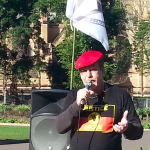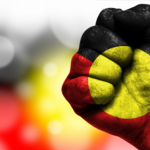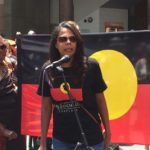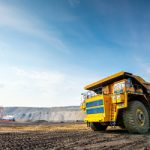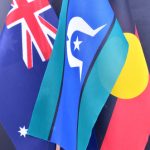Truth-Telling Before Treaty-Making: An Interview With Ken Canning
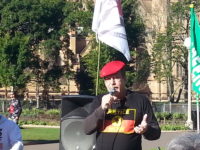
In late May, fourteen Australian organisations came out in support of the constitutionally-enshrined Indigenous voice to parliament. This was the proposal contained within the Referendum Council’s May 2017 Statement from the Heart.
Amongst the organisations that issued the response of support were BHP and Rio Tinto, which more than raised a few eyebrows, as mining companies like these have long benefited from extracting resources from Aboriginal land, rather than upholding First Nations rights.
The Coalition government has been consistent in its rejection of the voice to parliament. Turnbull officially rejected the idea in October 2017, Morrison dismissed it last September, while Dutton said there was no way the nation would consider the proposal just a few weeks ago.
The home affairs minister’s rebuff of the voice was in response to Indigenous affairs minister Ken Wyatt’s 10 July announcement that a referendum on constitutional change will be held. However, Mr Wyatt spruiked a national vote on constitutional recognition in his proposal, not the voice.
Treaty before recognition
BHP and Rio Tinto also support constitutional recognition. Both companies announced this back in mid-2015. And the federal government has long favoured this option, which entails recognising Aboriginal and Torres Strait Islander people in a preamble to the Constitution.
Although, around the same time the mining giants were throwing in their support, an IndigenousX survey found that 75 percent of First Nations respondents don’t support recognition. Some critics say recognition is a token gesture, while others warn it would involve ceding sovereignty.
And underlying this whole debate on Indigenous inclusion within the colonial founding document is the long advocated for proposition of treaty, which is an agreement established between two sovereign parties.
The truth must come first
This year’s NAIDOC theme was “Voice, Treaty, Truth”. Long-time Aboriginal rights activist Ken Canning doesn’t support the voice. But, he doesn’t want to talk treaty right now either. It’s the third aspect of the theme – truth – that he asserts has to be brought to the fore.
In a recent interview, the Murri elder stated that the government has to come to the table with the truth about this nation’s history, prior to any treaty-making. And he described a situation where politicians from both major parties are propagating lies that they themselves believe.
According to Canning, the government “has swung so far to the right” that there’s no point in trying to enter into any formal agreement with it, especially when politicians seem to be in a state of denial about the grave realities First Nations peoples are still facing in 2019.
Sydney Criminal Lawyers spoke to Ken Canning about his take on constitutional recognition, why treaty should be off the table for the time being, and the kind of truth-telling that needs to happen before any type of healing can take place.
Firstly, a fortnight ago, Indigenous affairs minister Ken Wyatt announced that he plans to hold a referendum on constitutional recognition, which is a proposal that’s been around for over a decade.
Mr Canning, what do you think about the newly-returned Morrison government coming to the table with this idea?
Firstly, it’s more than a decade that this has been around. The first time constitutional recognition was ever talked about in this country was in the 1920s.
Over the last decade, Aboriginal people have been asserting sovereign rights, very loudly. And in opposition to our sovereign rights comes this constitutional recognition.
My opinion is summed up in the first three letters: con. Once we are written into the Constitution, we will cede our sovereign rights. That’s the con.
The other point to make here is, he’s saying this is going to go to a referendum. This affects Aboriginal peoples. Around 2.7 percent of the population are Aboriginal. So, that means the majority of the vote will go to non-Aboriginal people, who don’t understand the full implications of what we are voting on.
This is very different from the 1967 referendum. This is much more complex. And a lot of people do not understand what the vote is.
Now, in affecting us, I would say that the vote should go to us. And I would hazard a guess that it would come out very differently.
Following the referendum announcement, there was a lot of media coverage around conservative Coalition ministers stating that they don’t want a referendum on a voice to parliament, even though this wasn’t being proposed.
The voice to parliament came from some of the delegates at the Uluru Summit. What do you think about the voice proposal that’s set out in the Uluru Statement from the Heart?
I’ve had conversations with people involved in this. And if you look closely at the Uluru Statement and the voice, you’ve got the same players who were involved with constitutional recognition. They rejected constitutional recognition. And now, they’re calling for the voice.
There’s a couple of things here. We’ve got the same players involved. But, more importantly, we’ve got the same companies backing both moves: Rio Tinto, KPMG, Lendlease, IAG, BHP, Woodside.
Would anybody who has regard for the rights of people on their own lands trust their future with groups like this bankrolling a move to have a voice in the constitution.
The other point is, the Anangu people – the traditional custodians of Uluru – have quite clearly stated they want their name removed from the statement. They want it called the Statement from the Heart, not from Uluru. They do not want to be associated with it.
But, the people who are involved with this have disregarded the traditional owners request for that. So, I don’t hold any confidence in this being anything but something that’s set up and bankrolled by big companies, colluding with government to take away what little rights we have left.
My simple statement is this: they are going to dig up Mother Earth, while they are burying Aboriginal peoples. If this goes through, that’s what will happen.
Most First Nations rights advocates are calling for treaty. But, you’ve just come out stating that at present a treaty is not the way to go. Why’s that?
We’re not at a point of history when we are ready for a treaty, or even anywhere near ready. We’ve got a parliament – both state and federal – that will not admit to the truths of history.
Despite protests from First Nations peoples, they are spending millions on statues of Cook, when we have uncovered that he was responsible for spreading venereal diseases throughout the Pacific Islands, with underage girls. He let his crews ashore to have their way with the young girls.
This was a man who was a demon. When he hit this country, the first action was to shoot a man out at Kurnell.
They’re going to spend all these millions of dollars to glorify this man. So, that tells me that our government is not prepared to tell the truth of history. And until they tell the truth of history, there is no point in a treaty.
The other intrinsic point is that justice must come before treaty. You cannot have a treaty, while we are still being killed in custody. You can’t have a treaty, while the incarceration rate of our women has gone up tenfold in the last six or seven years.
You can’t have a treaty, while kids as young as eight are taking their own lives, and we have the highest teen suicide rate in the world. You can’t have a treaty, while our children are being stolen at a higher rate than at any other time in history.
Things are going from bad to worse. This is not a platform for treaty. State and federal governments had the powers to step in and stop all these horrendous things happening, but they refused to. They absolutely refused to.
When governments show some good faith towards our peoples, maybe we can sit down and talk to them. But, now they’re going 90 miles the other way.
What else would you say needs to be part of this truth-telling?
We still haven’t told the whole history of this country. We’ve got oral histories. Oral history is not regarded as truthful history. I studied history at university, and every time I spoke about oral history, I was shot down with them saying, “It’s not recorded.”
My oral history is recorded. And it should be as automatically validated, as anybody who wrote history. One point I used to make was that if you pick up five written texts of history, you’ll find a different narrative. Yet, people still say it’s an accurate history, which is rubbish.
We need to validate our history. We need to be validated as the keepers of oral history. There are people all over the country, who will tell you, we had parents who were tied to trees. We had babies who were buried up to their necks. And we had soldiers coming along and smashing their heads off with rifle butts. You will not find that in the history books of this country.
We had some of the worst atrocities that have happened on the planet in this country. But, the truth has not been told.
People get us wrong on this point. I don’t want people today feeling guilty about this. But, the imperative thing is we all have to know how we got to this point now. We have to know before healing can commence.
No one will ever understand how we feel as a people, until they are told the full narrative. There are people walking around saying, “Why are they so upset. Get over yesterday.” These are scars that are literally passed down from generation to generation that we can’t get over.
And if people knew the full implications of what happened to us, maybe they’d understand a bit more. Then we can have dialogue. But, our governments continue to hide the history.
Back to the referendum. When the government is well aware of the voice to parliament proposal, as well as the decades-long call for treaty-making, why is it continuing to drag the debate back to recognition?
I stated at a forum in Sydney some four or five years ago that we have to fight against constitutional recognition in case they’re fair dinkum. But, I’ve always said that I don’t think they’re serious. I don’t think any of it is serious.
This is a debacle to waste money and to hijack the debate around deaths in custody, Stolen Generations and removing people off land so that mining companies can dig it up. It’s to hide away the fact that Australia is being investigated by the United Nations for human rights abuses against Aboriginal peoples.
It’s to hide all these horrendous things from the public, by saying, “Look what we are trying to do.” And then they will find a way to scrap it and they’ll blame us. That’s going to be the agenda.
Not long after the Statement from the Heart came out, there was the call for an elected body to advise parliament. Turnbull went on Q&A and said that this will never happen, because it will cause a third chamber in parliament, so he rejected it.
He was challenged by a Koori lawyer in the audience, who said an advisory body cannot be a third chamber. Turnbull kept saying, “Yes, it can be.” That’s rubbish. There are many non-Aboriginal advisory committees to parliament, and they’re not chambers.
As soon as we suggested an advisory body, even with the people the government selected, he scrapped the whole notion. Virtually everything was going to be shut down because it went off government plan.
This should ring alarm bells in anybody’s mind. If you don’t follow the blueprint the government is laying out. It’s not going to happen.
And lastly, Mr Canning, you’ve stated that 230 years in, now is not the time for a treaty with the Australian government in its current form. What do you want to see happen from here?
We haven’t seen any action from the government on things we’ve been screaming about for decades. I’m nearly 67. As far back as I can remember, we’ve been screaming to stop the high imprisonment rates and the killing of our people in gaols.
Before the Royal Commission, in the 1970s, people in prison up in Queensland were dying left, right and centre. It wasn’t investigated. People don’t realise that in the 70s, if a death in custody happened, there wasn’t a coronial inquiry. It was just a doctor signing a bit of paper to say cause of death.
Invariably, the doctor didn’t even see the body. He just took the words of the officers, signed cause of death and out they went. People don’t realise this went on. And these sorts of things have to come out.
But, also, what has to happen is that the horrific deaths in custody have to stop. They have the power to do that. They have the power to intercede on the states and say, “Clean your act up. Stop killing people in there.” But, they’re not doing it.
In 231 years, we have not had one policeman, or one prison officer, found guilty of the death of an Aboriginal person. Not one. Now I find that alarming – just that point alone.
You have to see the dangers in doing business with a government that will not prosecute its own people. We have a case recently with Rebecca Maher, where the coroner was highly critical. She virtually said if the police had followed protocol, Rebecca would have been alive today.
Now, that was the finding of the coroner. Yet, there was no recommendation of charges being laid against any police officer. If they had done their duty, an Aboriginal woman would be alive. Surely, that constitutes at least a charge of death by negligence, but that was not forthcoming.
We saw the horrific video clip of the last moments of David Dungay Jnr. The whole world saw it. That went all over the planet. He was beaten to death and strangled. Yet, no charges were laid.
This has to cease. How can you sit down and talk to people who are bent on killing you?


